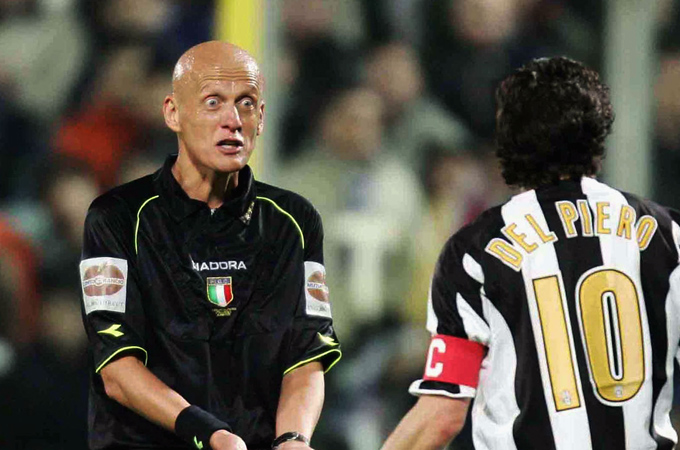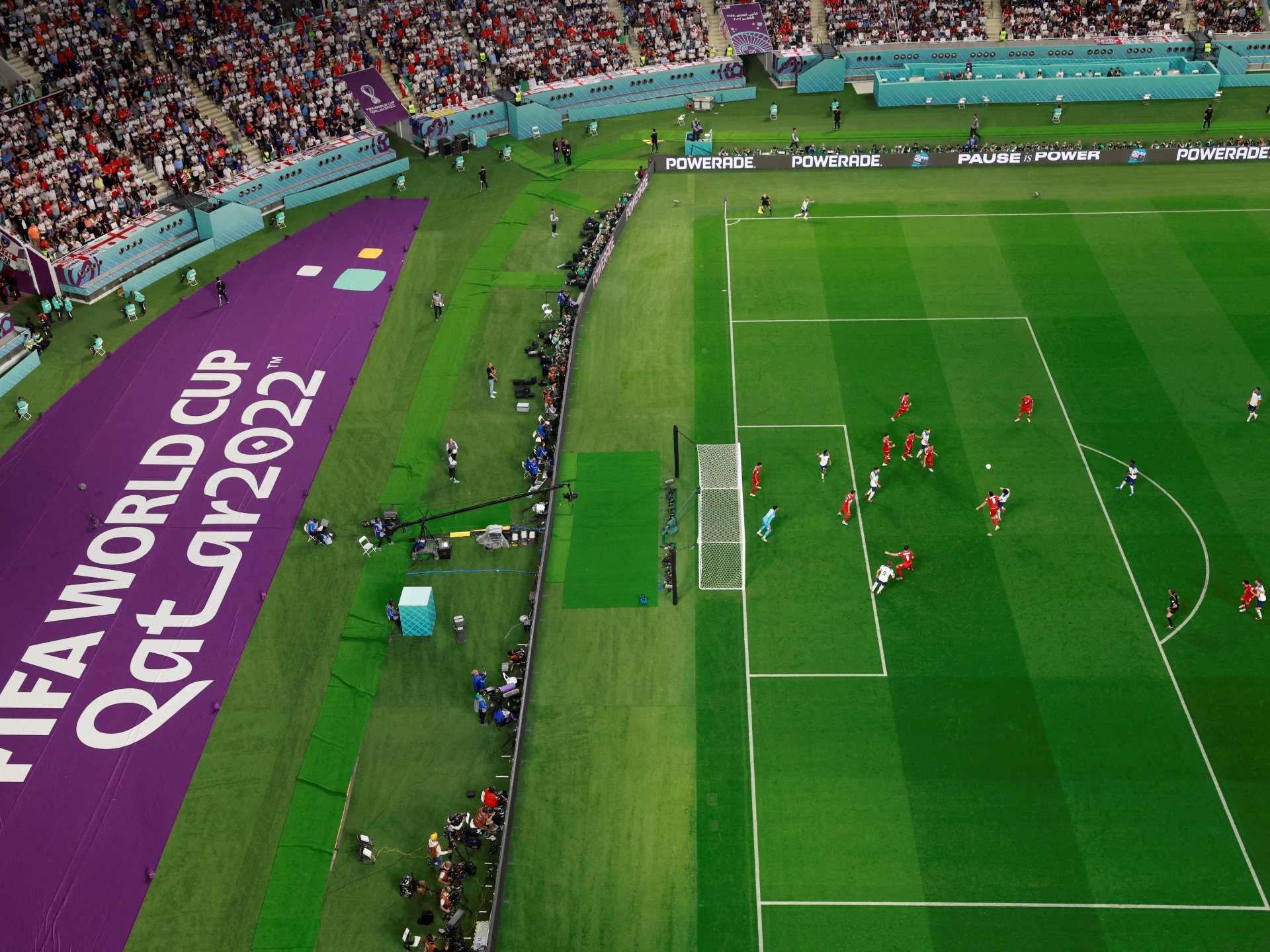Football history is being rewritten at Qatar’s 2022 World Cup.
Cristiano Ronaldo’s goal against Ghana made him the first male player to score in five World Cups. Lionel Messi has played his 1,000th match and scored his first knockout-stage goal. Oliver Giroud scored his 52nd goal for France, a record for the team.
But when England pulverised Iran 6-2, the match set a more obscure FIFA record: It was the longest World Cup group stage match.
By the time the final whistle blew, both sides had played 117 minutes. The marathon match had stretched an extra 27 minutes across both halves due to a series of stoppages that were added as part of FIFA’s relatively new time-policing efforts.
During the group stages, referees added a total of 563 minutes of play – more than nine hours. Only one of the tournament’s eight opening games finished under 100 minutes.
In the 1-1 draw between Wales and the USA, 14 minutes and 34 seconds were added to the clock while 12 minutes and 49 seconds were tacked onto the Netherlands vs Senegal game. The opening match between Qatar and Ecuador saw 10 minutes and 18 seconds of stoppage time.
So why has there been so much stoppage time at the 2022 World Cup?
Football matches are supposed to be 90 minutes of normal time unless it’s a knockout match. FIFA’s fourth officials routinely add time at the end of each half.
At the 2018 World Cup, FIFA began heavily policing stoppage times to account for time spent on injuries, celebrations, video assistant referee (VAR) reviews and substitutions.

Before this year’s World Cup, Pierluigi Collina, chairman of FIFA’s referees committee and a former referee himself, warned fans to brace themselves for a number of games eclipsing 100 minutes.
“This is nothing new,” Collina told reporters in November. “In Russia, it became quite normal for the fourth official to show the board with seven, eight, nine minutes on it.”
The goal for FIFA, he said, is to maximise effective playing time.
“Whenever there will be an incident like treatment, substitution, penalty, red card or celebration of a goal – I want to underline that because it is a moment of joy for one team, for the other maybe not – but it may last one or one and a half minutes,” he said.
FIFA has long complained about lengthy goal celebrations and unnecessary showboating, which can sometimes span a minute or more.
“So imagine in a half there are two or three goals scored, and it’s easy to lose five or six minutes, and this team must be compensated at the end,” Collina said.
Other football experts have argued that stoppage time should be welcomed by fans looking to get the most bang for their buck after shelling out plenty of money to watch a match at a stadium.
“I think it’s good for the game because fans are just as important as anybody else,” retired FIFA and English Premier League referee Mark Halsey told Al Jazeera. “It costs a lot of money to watch football. We want to see the ball in play longer. That’s what we want. We’re getting 90-plus minutes now.”
VAR has drawn global criticism since its debut at the Russia World Cup. It tracks every limb of players on the pitch and uses semiautomated technology through the use of cameras, sensors and video replay to make offside calls and overturn goals.
In Qatar, specifically, many fans have complained that the technology has cramped the flow of the game, sometimes adding several minutes to a match’s stoppage time.

The stoppages have sewn discord across the football world with some players expressing displeasure about the added time due to the heightened possibility of injury.
During time added on in this World Cup, Iran’s goalkeeper Alireza Beiranvand sustained a severe concussion against England. Saudi Arabia defender Yasser Alshahrani was also hurt when he was kneed by his own goalkeeper Mohammed Alowais vs Argentina.
The international players union Fifpro said it’s monitoring the situation.
“If effective playing time is increased by 10 to 15 per cent, this adds substantially to the time under physical competition for players,” Fifpro General Secretary Jonas Baer-Hoffmann said. “More than anything, it underlines how critical workload protection is for players. It needs to be established now.”
Some players, though, appear to be taking a shine to the longer matches.
“Enjoying the amount of time that is being added on by the officials at the Qatar World Cup 2022,” Former England and Liverpool midfielder Jamie Carragher said on Twitter. “There is too much time wasting in football!”
Enjoying the amount of time that is being added on by the officials at #QatarWorldCup2022 there is too much time wasting in football!
— Jamie Carragher (@Carra23) November 21, 2022
Domestic football leagues aren’t entirely sold on the new FIFA rules. The Premier League said it won’t implement the strict new time stoppage regulations after the World Cup.
Some fans have even blamed entire match outcomes on the stoppage times.
When Iran scored two goals in stoppage time, cruising to a 2-0 win over Wales, some were quick to pin the Welsh defeat on the new time-maximising initiative.
“Interesting observation,” football YouTuber Mark Goldbridge tweeted on November 25. “Wales lost because of this FIFA directive to add unprecedented amount of stoppage time to games.”
South American football correspondent Tom Vickery likened the stoppages to “adding extra rounds at the end of a boxing match”.
“Not in favor of these giant stoppage times,” Vickery wrote on Twitter. “Grinding the players into the ground. 4 would have been fine. 9? Not for me.”
While stoppage time has decided some matches, it’s also allowed teams to forge history by other means.

Cameroon’s second-half winning goal against Brazil came in stoppage time. While the goal wasn’t enough to score Cameroon a spot in the last 16, Vincent Aboubakar’s conversion, afforded by the added time, made Cameroon the first African nation to beat five-time World Cup champions Brazil.
Over the years, a number of alternatives to stoppage time, designed to crack down on football’s time-wasting, have also been proposed. In 2017, FIFA’s then-technical director, Marco van Basten, proposed a 60-minute, stop-start game clock, not unlike basketball. The idea, however, never was implemented.
Others have suggested that bringing in an independent timekeeper, similar to rugby, could be another alternative to lengthy stoppage time.
“If you’re stopping the clock, it will be the timekeeper stopping that clock every time that ball goes out or every time that ball goes – every time there’s a substitution, every time there’s a goal-scoring celebration – then that timekeeper starts the clock then restarts it when the ball’s back in play,” Halsey told Al Jazeera English.
Halsey cast goalkeepers as the worst repeat offenders when it comes to time theft.
“I was a goalkeeper, so you do see goalkeepers taking their time,” he said. “What they tend to do now, they tend to catch that ball, the ball comes into them and then they fall to the ground with no one around them, lie on the ground, have a little look around, … then they get up and they start to perhaps get the ball back into play. I think you’re looking in excess of more than 10 to 15 seconds when the goalkeeper has a hold of a ball.”
Halsey suggested a time limit of 10 seconds and, if keepers exceed that limit, punishing them with an indirect free kick and a yellow card.
“I think referees do need to be stronger in managing those situations,” he said.
